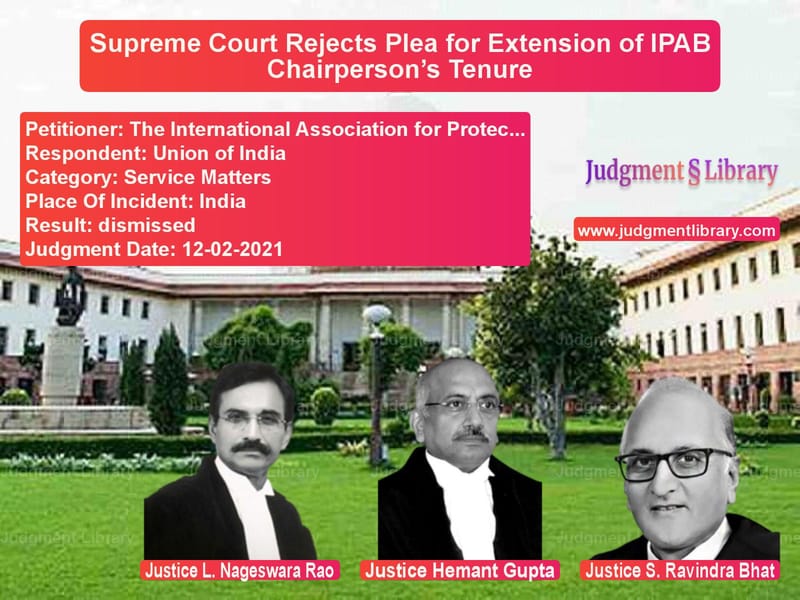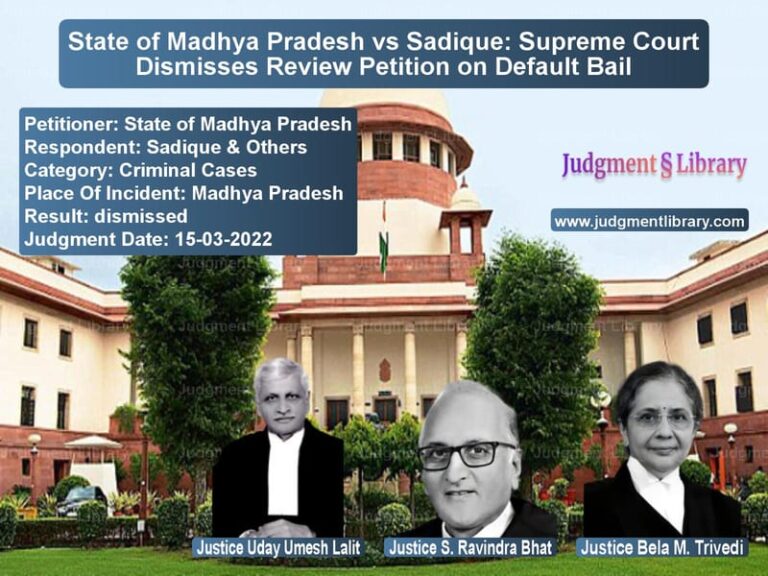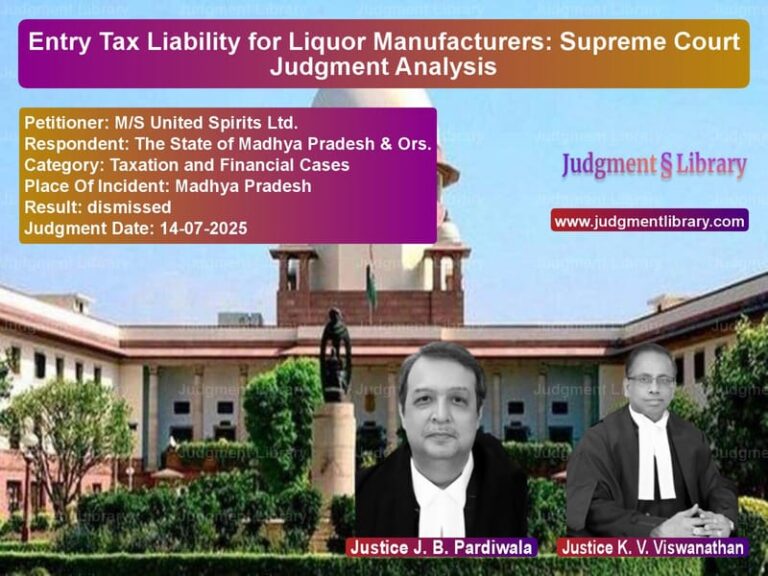Supreme Court Rejects Plea for Extension of IPAB Chairperson’s Tenure
The Supreme Court of India recently dismissed a plea seeking the extension of the Chairperson of the Intellectual Property Appellate Board (IPAB). The case, The International Association for Protection of Intellectual Property (India Group) vs. Union of India, involved a petition for the continuation of the incumbent Chairperson beyond the term specified under the Finance Act, 2017. The Court ruled that the extension was not legally permissible and emphasized the importance of appointing new members as per the existing legal framework.
The petitioners, an organization advocating for intellectual property rights, argued that the incumbent Chairperson’s tenure should be extended to ensure continuity in the Board’s functioning. The Supreme Court, however, ruled that the tenure had already ended and could not be extended through judicial intervention.
Background of the Case
Intellectual Property Appellate Board (IPAB)
The IPAB was established under the Trademarks Act, 1999, to adjudicate disputes related to trademarks, patents, and copyrights. The Board consists of a Chairperson, Vice-Chairperson, and technical and judicial members.
Tenure of the Chairperson
The appointment of the IPAB Chairperson is governed by the Finance Act, 2017, which set uniform terms for members of various tribunals. Under Section 184 of the Act:
- The Chairperson’s tenure is a maximum of five years.
- The upper age limit is 70 years.
The incumbent Chairperson, appointed in 2017, was due to retire on September 21, 2019. However, due to ongoing legal challenges regarding tribunal rules, his tenure was extended temporarily through judicial orders.
Petitioner’s Arguments
The International Association for Protection of Intellectual Property (India Group) contended that:
- The incumbent Chairperson was originally appointed under Section 89A of the Trademarks Act, which was later amended by the Finance Act.
- The Madras Bar Association judgment (2020) clarified that existing members could continue under old rules.
- The IPAB was currently without a judicial member, and the absence of a Chairperson would affect its functioning.
- The Finance Act allows Chairpersons to serve until 70 years, while the previous rules only allowed up to 65 years.
Respondent’s Arguments
The Union of India and other respondents opposed the plea, arguing that:
- The Chairperson’s term had legally expired.
- The Finance Act does not automatically extend tenure beyond the initial term.
- The Court’s interim orders had only allowed continuity until new rules were framed.
- New appointments should be made as per the updated rules rather than judicially extending expired tenures.
Supreme Court’s Observations and Judgment
Tenure Cannot Be Extended
The Supreme Court, comprising L. Nageswara Rao, Hemant Gupta, and S. Ravindra Bhat, ruled that the Chairperson’s tenure had already ended as per the applicable rules. The Court observed:
“The Finance Act, 2017, does not itself grant an automatic extension of tenure. The maximum age limit of 70 years only applies prospectively and does not override existing tenure rules.”
Tribunal Appointments Must Follow Due Process
The Court emphasized that new appointments must be made as per the Finance Act and existing rules:
“Appointments to tribunals should be made following due process. Extending tenure beyond legal limits through judicial orders is not permissible.”
IPAB Can Function Without a Chairperson
The petitioners argued that the Board could not function without a judicial member. However, the Court ruled that:
- The Vice-Chairperson or senior-most technical member could temporarily act as Chairperson.
- Existing members had sufficient legal expertise to conduct hearings.
The Court dismissed concerns that the Board would become non-functional in the absence of a Chairperson.
Impact on Tribunal Reforms
The ruling reaffirmed the Supreme Court’s stance on tribunal reforms and emphasized the need for clear appointment procedures. The Court directed the government to expedite appointments to tribunals to avoid administrative delays.
Final Judgment
- The Supreme Court dismissed the plea for extending the Chairperson’s tenure.
- The Court held that new appointments must be made as per the updated rules.
- The ruling reaffirmed that judicial orders cannot override statutory tenure limits.
Key Takeaways from the Judgment
- Tenure extensions beyond statutory limits are not permissible.
- Tribunal appointments must follow the Finance Act, 2017.
- Judicial intervention cannot override statutory provisions.
- The IPAB can function with existing members even in the absence of a Chairperson.
- The government must expedite tribunal appointments.
Impact of the Judgment
The ruling has significant implications for tribunal governance in India. It ensures that appointments to judicial bodies follow legal procedures and prevents ad-hoc tenure extensions. By rejecting the plea for extension, the Supreme Court has reinforced the need for systematic appointments and compliance with tribunal laws.
Conclusion
The Supreme Court’s decision in The International Association for Protection of Intellectual Property (India Group) vs. Union of India is a landmark judgment in tribunal governance and judicial accountability. It sets a clear precedent that statutory tenure limits must be respected and appointments must follow due process.
This ruling ensures that the Intellectual Property Appellate Board (IPAB) functions within the legal framework and encourages the government to make timely appointments to avoid administrative disruptions.
Petitioner Name: The International Association for Protection of Intellectual Property (India Group).Respondent Name: Union of India.Judgment By: Justice L. Nageswara Rao, Justice Hemant Gupta, Justice S. Ravindra Bhat.Place Of Incident: India.Judgment Date: 12-02-2021.
Don’t miss out on the full details! Download the complete judgment in PDF format below and gain valuable insights instantly!
Download Judgment: the-international-as-vs-union-of-india-supreme-court-of-india-judgment-dated-12-02-2021.pdf
Directly Download Judgment: Directly download this Judgment
See all petitions in Public Sector Employees
See all petitions in Judgment by L. Nageswara Rao
See all petitions in Judgment by Hemant Gupta
See all petitions in Judgment by S Ravindra Bhat
See all petitions in dismissed
See all petitions in supreme court of India judgments February 2021
See all petitions in 2021 judgments
See all posts in Service Matters Category
See all allowed petitions in Service Matters Category
See all Dismissed petitions in Service Matters Category
See all partially allowed petitions in Service Matters Category







